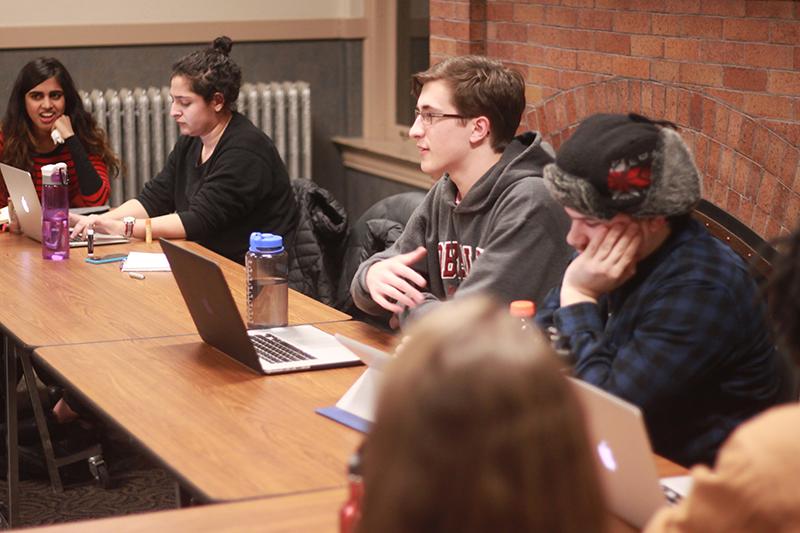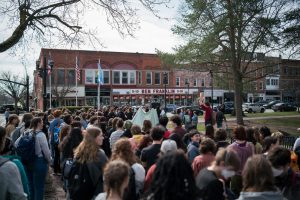Working Group Prioritizes Mental Health
Student Senators, College first-year Anjali Kolachalam (left), College junior Rachel Weinstein and College sopho- more Cory Ventresca watch as double-degree sophomore Jeremy Poe (center) presents the Student Health Work- ing Group’s plans for this semester at the Senate plenary last Sunday. The group is working on several initiatives to improve mental health services on campus.
February 27, 2015
Members of Student Senate’s Student Health Working Group are pushing for a variety of initiatives this semester to improve the accessibility, visibility and quality of student mental health services, which many feel are not serving their needs.
College junior Avalon McKee, co-chair of the Oberlin Mental Health Alliance and member of the Student Health Working Group, said she hopes these initiatives will address both short-term and long-term concerns.
“In a lot of our initiatives, we have to be thinking short term because we want to help students now, but [we] also [want to think] long term,” McKee said. “So we know there’s a lot of things to work on, [and] a lot of it has to do with funding, but we have to think about and advocate for students now and let them know that if they have a bad experience, that they should tell someone.”
One of the more immediate goals, which the group hopes to acheive within the next few weeks, is to launch a website with a comprehensive list of mental health resources, including support groups and information on the College-run Counseling Center.
Jeremy Poe, double-degree sophomore, Senator and Senate Liaison for the Student Health Working Group, said the College’s web sites are confusing and outdated, making information on services — and even the number for the emergency hotline — difficult to access.
“There’s a lot of contradictory information because of the slew of web sites Oberlin has, and information doesn’t always get updated,” Poe said. “Then, as a result, there’s not a lot of student knowledge about the different resources that are offered and the specifics of them.”
The new website will also include information on resources for physical wellness. Researchers have found strong links between exercise and decreases in anxiety and depression, according to a 2007 review article in the Journal of Psychiatry and Neuroscience.
“When you run and work out, it releases serotonin, which is what people lack typically when they’re depressed or have anxiety,” said College senior and OMHA co-chair Christine Antonsen. “It’s a very good way to deal with stress and depression.”
Members of the working group are also looking into ways to improve the Counseling Center, and they hope to implement a feedback form for visitors within the next month.
This will provide a way to gather more feedback on a center where some students reported having negative experiences.
Antonsen said her own experience with the Counseling Center has been alternately both great and unhelpful, and she feels students often only share the problems they’ve had with the service and not the good experiences.
“Not everyone’s experience at the Counseling Center is going to be beneficial, but no one really talks about how great it is,” said Antonsen. “If they have a problem with it, they’re going to talk about it, [but also] I’m not delegitimizing anyone’s problems. They are so real.”
Despite concerns, the Counseling Center is frequently used by students. So far this academic year, 530 unique students have visited the Center, with many returning multiple times. Between 2008 and 2013, the Counseling Center served on average 21 percent of the student body, according to year-end reports. According to the 2012-2013 Association of University and College Counseling Center Directors’ Survey, the national average for all colleges and universities is far lower at nine percent.
However, the rate of depression is also higher at Oberlin than the national average. According to a 2012 survey by the American College Health Association, 45.1 percent of Oberlin students — over 15 percent higher than the national average — reported feeling “so depressed it was difficult to function” within the last 12 months.
While the Counseling Center is a resource, it does not provide long-term help, and students in need of these services are asked to seek treatment off-campus. The working group plans to implement a way to gather feedback for off-campus mental health services, as well as work with Rideline and Safety and Security to provide confidential transportation.
“A lot of students, if they’re looking [at] longer than a semester with having a personal therapist, … have to go to outside resources, and then your options become limited to where you can walk,” said Poe.
While Safety and Security does offer transportation to CVS and Student Health, if all students knew about these services, Safety and Security wouldn’t have the resources to provide these rides, according to Antonsen. Poe feels this is an important service to offer and possibly expand.
“It’s also looking forward with the hope that [Safety and Security] can be involved in the discussion of what role they should play in student wellness, whether it’s accessibility and stuff or just giving rides to student health,” said Poe. “Especially if you’re on South Campus, doing that walk this time of the year is a big deterrent and prevents a lot of students from doing that.”
The group is also working on issues of mental and physical wellness including providing free Plan B One-step Contraception over the weekend and transportation to pick it up. Currently, Plan B is free through Student Health but Student Health is closed on the weekends, forcing people in need of free Plan B to wait up to three days during this time.
“It’s at most three days, if you need to get it for free, [of] being really anxious,” said McKee.
Members of the working group also want to provide and promote services beyond Student Health and the Counseling Center. The group has met with students who run a variety of peer support groups for survivors of abuse, self-harm and eating disorders.
Poe supports these groups but also feels it’s important to maintain a balance between providing these services and having institutional structure and consistency.
“Oberlin students are more distrustful of authority than the average college student,” said Poe. “You have students setting out on their own and providing these really good services, which are really effective. … My concern with them is that when the student who runs it graduates or goes away for a semester to study abroad, it basically either falls apart or becomes something very different. We want immediate help, but we also want to ensure continuity and to ensure that this isn’t just the work of individuals. Then it becomes institutional.”
Partially in response to this concern, students started the board for the Peer Support Center last semester to serve as a governing body for an organization that will help students support each other and provide information on peer support groups as well as other social events happening on campus.
“Our intention is to function as a hub of communication among groups that are doing peer-helping work on our campus and serve for them to communicate with each other,” said Dana Kurzer-Yashin, College sophomore and member of the Student Health Working Group.
The group has not yet started providing services and, while it’s taking longer to set up than originally planned, McKee and Kurzer-Yashin want the Center to be as prepared as possible before they begin interacting with the student body.
“While it’s unfortunate it’s taking such an extended amount of time and longer than it was initially hoped for … ultimately there’s a lot of legal questions about accountability that have to be [answered],” said Poe. “I think it’s a lot better [than] having them just shooting from the hip from the get-go.”


























